
Digital Evolution: The Rise of Gamified Learning

As the digital landscape continues to evolve, the realm of education is undergoing a transformative shift, significantly influenced by advancements in gaming technology. With platforms like 222ACE at the forefront, educational systems across the globe are increasingly adopting gamification as a means to enhance learning experiences. The concept of turning educational content into interactive games is not entirely new, but the level of immersion and engagement achievable today is unprecedented.
One of the major contributors to this shift is the widespread accessibility of technology. In the past, incorporating games into educational curricula was often hindered by logistical and technical challenges. However, as both internet connectivity and device availability have surged, educational institutions are now able to leverage game-based learning tools more effectively. These technologies not only make learning more fun but also cater to various learning styles, ensuring more inclusive educational experiences.
Platforms such as 222ACE are leading the way by offering a wide variety of educational games that cater to different subjects and age groups. From basic arithmetic to complex scientific concepts, these games are designed to challenge students while simultaneously reinforcing curriculum goals. Teachers are finding new ways to integrate these tools into their lesson plans, using them to supplement traditional teaching methods.
In addition to improving engagement, gamification has been shown to enhance retention rates among students. The interactive nature of games provides immediate feedback, allowing learners to understand and correct their mistakes in real time. This leads to a deeper understanding of the material and increases the likelihood of retaining the information.
Critics, however, caution against an over-reliance on gamification. While the benefits are clear, there is a risk that too much emphasis on games could distract from the core educational objectives. Therefore, balance is key; educators must ensure that gamified learning remains supplementary and not a replacement for foundational classroom experiences.
As we stand on the cusp of further technological innovations, the use of gamification in education is set to expand. With continuous advancements in virtual reality and artificial intelligence, future educational games may become even more sophisticated, offering highly personalized learning experiences. The challenge moving forward will be to harness these technologies effectively, ensuring equity in access and maintaining a focus on educational outcomes rather than just entertainment.
The Rise of 222ACE: A New Era in Online Gaming
Exploring the rise and impact of 222ACE, an innovative English gaming platform capturing the attention of virtual entertainment enthusiasts globally.
Reviving Classic Gaming for the Modern Era
Explore how 222ACE is bringing back classic gaming experiences with an online twist.
Innovative English Gaming Platform Revolutionizes User Engagement
Discover the impact of the English gaming website '222ACE' and how it is shaping the future of online gaming through dynamic user engagement and innovative features.
 Skip to content
Skip to content





